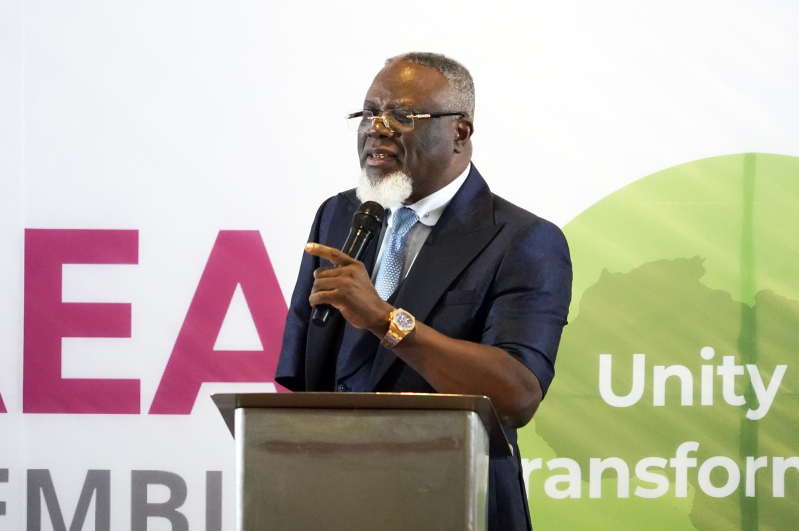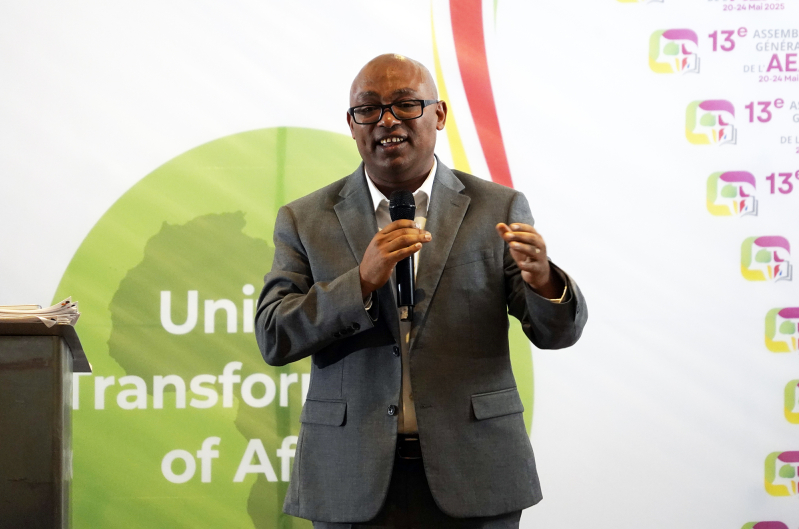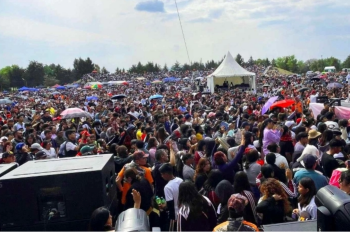
The 13th General Assembly of the Association of Evangelicals in Africa (AEA) continued on Friday, May 23, with a compelling call for theological education in Africa to be both contextually relevant and widely accessible. Two leading educators, Dr. Daniel Kawata and Dr. Habtamu Umer, delivered keynote presentations urging evangelical leaders to radically rethink how they train pastors and equip church leaders across the continent.
Dr. Kawata, a Francophone theologian with deep roots in both informal and formal theological education, and Dr. Umer, founder of the Church Transformation Network (CTN) based in Ethiopia, each brought decades of experience to bear on a theme that has emerged as central to Africa's evangelical future: how to build the capacity of the Church to disciple, lead, and transform society in light of explosive growth and limited pastoral training infrastructure.
A dual path: formal and informal theological education
Kawata, speaking in French, drew from his personal journey to highlight the catalytic role of both informal and formal theological education. He described how he first encountered the power of the gospel not through seminary study but through informal Bible training programs in the 1980s offered by Mennonite missionaries.
“That foundational experience shaped my Christian life and leadership,” he said. Kawata recalled walking 47 kilometers to a remote village to evangelize. Despite heavy rains during the dry season and spiritual opposition, he and a small team of young evangelists persisted, witnessing visible spiritual impact. Years later, a military general told him that his father—a tribal chief—had converted to Christianity after Kawata's preaching, and that the entire family had followed in his footsteps.
Yet Kawata did not stop at informal education. Later, when entrusted with a parish, he launched low-cost formal training programs for pastors lacking theological instruction. With a modest budget of under \$2,000 per year, he was able to offer a dozen courses to more than 300 pastors over three years.
“I came to understand that both informal and formal education are essential,” Kawata said. “Informal training makes theology accessible; formal education gives it structure and depth.”
Kawata stressed that the African Church must not neglect either model. Informal systems, such as community-based Bible study networks, are often the only option in rural or resource-poor contexts. Formal institutions, however, are critical for theological accuracy, leadership development, and doctrinal clarity. He called for greater integration between the two, along with increased interdenominational cooperation to maximize reach.
“The growth of the Church is outpacing the growth of trained leaders,” he warned. “We must innovate with both humility and theological conviction.”
A continental vision: training one million pastors
While Kawata grounded his presentation in personal testimony and grassroots formation, Dr. Habtamu Umer approached the topic from a continental systems-level perspective. His proposal was as bold as it was urgent: to train over one million strategic church leaders across Africa within the next decade.

“If we do not change the way we train pastors, we will face a leadership crisis that will cripple the mission of the Church,” Umer said. He recounted data from his own denomination in Ethiopia, which has around 10,000 congregations but, after decades, had only trained 500 pastors through formal means. “At that rate,” he said, “it would take 800 years to train one pastor per congregation.”
CTN has developed a scalable, decentralized training model based on local partnerships, digital tools, and a contextualized curriculum that has already reached more than 65,000 pastors across Africa and Southeast Asia. These pastors lead an estimated 41 million believers.
The model is structured around learning communities—small groups of pastors meeting regularly to study customized theological modules through self-directed learning, practice, and peer discussion. Facilitators are drawn from within denominations, trained, and empowered to lead cohorts. Umer emphasized that this is not a replacement for seminary but a supplement and catalyst.
“We do not bring hundreds into auditoriums for lectures,” he said. “We build small communities of learning that multiply.”
Partnership with AEA and a strategic framework
In 2024, CTN signed a memorandum of understanding with AEA to pursue the one-million-pastor vision. Umer said the partnership reflects the need for a unified, continent-wide response to a rapidly growing Church and rising theological challenges.
The framework, called PREPARE, includes seven key components: interdependent relational partnership, rigorous strategic planning, relevant curriculum design, practical methodology, collaborative implementation, measurable transformation outcomes, and sustainable multiplication.
Umer underscored the importance of adapting training content to local realities. “We are not afraid to revise or discard irrelevant modules,” he said. “We want what works in context.”
He also revealed CTN’s learning management system (LMS) pilot, being tested in Ethiopia with 1,000 pastors in both urban and rural settings. This digital component is designed to supplement in-person learning with scalable, low-cost access to resources and mentorship.
Both speakers grounded their arguments in demographic trends. Umer cited projections showing Africa’s Christian population could reach 1.2 billion by 2050, adding 20 million believers annually. To disciple and pastor this expanding body, Africa would need to train at least 100,000 pastors per year.
Kawata agreed, noting that Africa now has 54% of its population identifying as Christian—a leap from just 9% during the colonial era. Yet he warned that many of these believers lack systematic discipleship.
“We are gaining converts, but not forming mature disciples,” he said.
The challenge of false teaching and leadership crisis
Both men highlighted the dangers of theological illiteracy. Kawata shared a story of a neighboring preacher who divided the Church into “spiritual” and “carnal” members, distorting the concept of the Body of Christ. Umer offered a blunt metaphor: “Letting an untrained pastor lead a church is like letting a hospital guard perform surgery.”
He warned that false teaching, spiritual abuse, and moral failure are symptoms of an under-equipped clergy. In some cases, church leaders lack even basic literacy. “Some pastors say they received their knowledge directly from God,” Kawata said. “But if they cannot teach others to know God, what legacy are they leaving?”
Umer shared evaluation data from CTN’s program in Ethiopia. Before training, 67% of pastors preached only once per month; after training, nearly 71% were preaching weekly or biweekly. Pastors reported deeper engagement with Scripture, more disciplined sermon preparation, and renewed pastoral care.
“We are not just increasing knowledge; we are increasing impact,” Umer said. He noted that bishops and denominational leaders have begun joining training sessions themselves.
African-led innovation to meet African needs
Kawata and Umer both emphasized the need for African-led theological innovation. Kawata called for greater integration of theology and local culture, warning that biblical truth must not be perceived as a foreign import.
“The gospel must be contextualized, not compromised,” he said. “Sin can hide under the guise of culture, but theology must expose and redeem it.”
Umer echoed the call for locally relevant curricula. “We don’t need to reproduce Western models,” he said. “We need models that reflect African realities and are led by African voices.”
CTN plans to expand into Southern and West Africa in 2026, targeting 10 new countries. Umer said that digital training, combined with local mentorship and organizational ownership, makes the vision feasible without massive overhead.
He invited partnerships with other networks and seminaries, noting that many modules can be adapted to various theological traditions and languages.
“We are open-handed,” he said. “We want to share resources and create a pan-African ecosystem of theological transformation.”
Dr. Kawata concluded with a plea to prioritize substance over form. “Let us prepare leaders who can feed the flock,” he said. “We must teach truth that transforms.”





